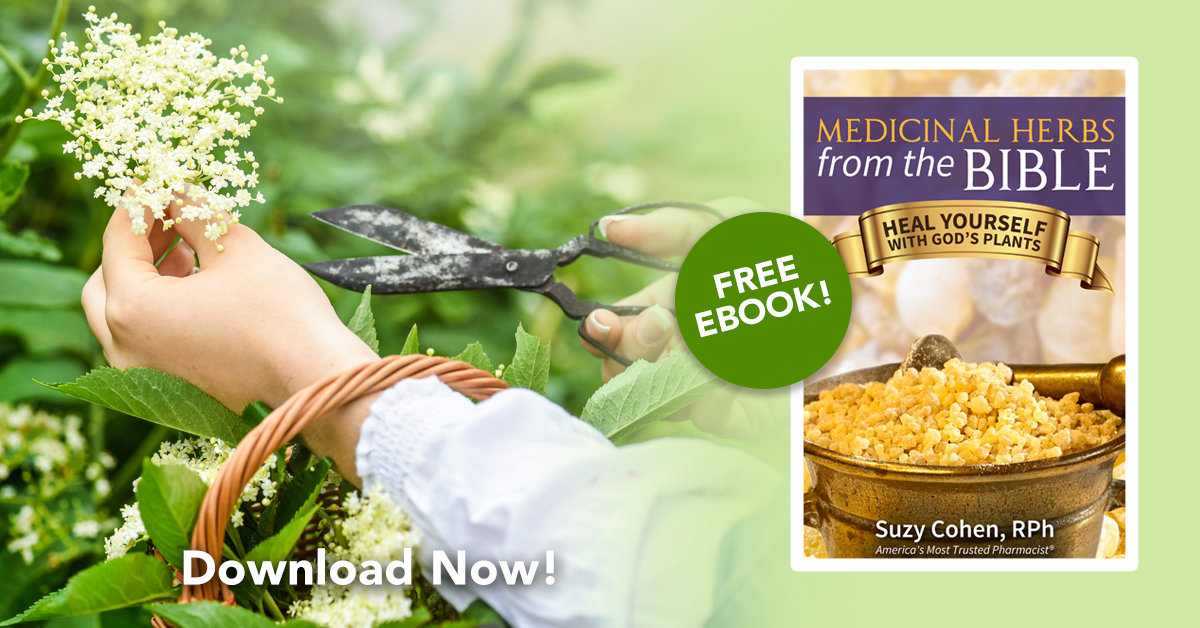Frankincense is popular around Christmastime and the resin and oil have been used in sacred religious spaces as incense and healing treatments. The smudging or burning of frankincense resin was done during Biblical times as a form of prayer as the incense rose up to the heavens similarly to smoke from a fire. Here’s a fun fact: it takes about a half a pound of resin to produce a little bottle of essential oil of frankincense (15ml). That’s why it’s so expensive, but in my opinion very well worth it. Few if any medicines from a pharmacy have the power to do what frankincense does!
Frankincense resin is extracted out of trees that belong to the genus Boswellia, and that is why you see “Boswellia” on the ingredient list of dietary supplements, essential oils and other commercial products. Like turmeric/curcumin, the boswellia-derived products are extraordinarily popular today, especially to treat joint pain, cancer, asthma and infections.
In today’s article, I’ll share the most common benefits of boswellia. These perks will stay with you throughout the year, not just in December when the medicinal herb is purchased the most.
This sticky sap offers more benefits than first meets the eye. There are many species by the way, the most common of which in America is Boswellia serrata. Clinical trials show that “boswellic acid” have anti-inflammatory properties so powerful that they rival non-steroidal anti-inflammatory drugs (NSAIDS).
A crucial difference is that the medications have the ability to produce uncomfortable side effects like gastric ulceration and heartburn, and boswellia does not. Below is a video that I made about Frankincense and Myrrh. Join the other hundreds of thousands of people who have viewed it by clicking on the image below!
What Is Boswellia Resin exactly…
More commonly known as Indian frankincense, Boswellia resin is an herbal extract that is derived from the Boswellia tree. Of the three main varieties of Boswellia (serrata, carterii, and frereana), serrata is the most used in natural medicine. The variety used differs according to regions around the world. One of the most popular places to find a Boswellia tree is in the Arabic country called Oman, which is on the southeastern coast of the Arabian Peninsula in Western Asia.
Aside from Oman, this beautiful large branching tree is also native to India and the Middle East. The bark on the trunk feels a little like paper and removes easily. The trunk has been tapped for centuries to extract the valuable sap, termed resin. This often takes place during the dry season. The sap is sticky at first then dries out a little, but it’s kind of gummy. By the way, a Boswellia tree can produce pretty flowers that are yellowish-white.

Top 10 Health Benefits of Boswellia
1. It Reduces Body Pain
Because Boswellia acts as an anti-inflammatory, it functions as a powerful painkiller for numerous physical ailments. There are some articles that suggest it might interact with conventional anti-inflammatory medications and potentially decrease their effectiveness, so talk with your doctor before combining treatments.
Essentially, this happens because the boswellia is binding to the same receptor sites on your cells that a drug does, and it will compete, and knock the drug off. Is that bad? Possibly, because it puts more drug into your blood stream by knocking it off your cells.
The way to account for that is to reduce the medication dose if you’re sustained on Boswellia, and as you step the herb up, you step the drug down (dosage-wise). But all this needs to be discussed with your doctor and the timeline for titration varies from person to person.
2. It Helps With Joint Pain
There are hundreds of scientific papers supporting the use of boswellia for joint inflammation and pain. It’s rather impressive, in terms of the potential for treating osteoarthritis. A STUDY published in Phytomedicine
showed that boswellia could reduce arthritic knee pain in all of the study participants, while it also increased their mobility and endurance. Further RESEARCH shows that taking a Boswellia supplement orally, for 3 months, reduced the severity of symptoms far better than a placebo.
Not all joint pain is driven by wear-and-tear, sometimes it is an autoimmune condition, as is the case with rheumatoid arthritis. A randomized double-blind research STUDY reveals that Boswellia supplementation can reduce joint swelling even if it’s triggered by rheumatoid arthritis.
It can help with back pain too. I recall getting beat up by a massage therapist at a walk-in place in the mall. (CLICK HERE to read 12 Surefire Ways to Relieve Back Pain, Muscle Spasma and Karate Chops.)
3. It Eases Asthma Symptoms
Boswellia extract shows EVIDENCE of reducing leukotrienes, which are compounds that cause your bronchial muscles to contract. In that trial, 70% of participants showed improvement over 6 weeks, whereas only 27% of the controls improved.
Boswellia can help mitigate asthma symptoms by keeping your airways open so you can take in oxygen and breathe with more comfort. This is very important for asthma sufferers who have little to go on, and episodes of bronchospasm can be rather terrifying, uncomfortable and sometimes fatal! Sometimes asthma and allergies can be addressed naturally, so if you have a moment, CLICK HERE to read my article, Allergies and Your Genes, Histamine, Autoimmunity and Your DAO SNPs.
This natural beautiful golden sap not only helps reduce asthma symptoms, but it also has immune-balancing benefits that reduce your reaction to the environmental allergens.
That added benefit is a perk to allergy-sufferers as well as those with asthma. If you have frequent allergies, you can add a few drops of essential oil to a cloth and breath it in several times a day. You can put a few drops onto your pillow case too.
4. It Relieves Ulcerative colitis
For those with ulcerative colitis, Boswellia resin might provide relief. Some RESEARCH shows that it can reduce your risk of suffering a remission by 70% to over 80%, and it seemingly works as well as the commonly prescribed drug sulfasalazine (Azulfidine).
There are two interesting points I want to make right now…
One, we see that once again, boswellia has a pacifying effect on autoimmune attacks (see above for its positive impact on another autoimmune condition, rheumatoid arthritis).
And two, Azulfidine is an immunosuppressant, classified as a “disease-modifying anti-rheumatic drug (DMARD), but boswellia is not. It doesn’t really suppress your immunity, it balances it, which I think is rather impressive. While we’re on the GI tract, keep reading…
5. Treats Symptoms of Crohn’s
One of the gold standard drugs for Crohn’s disease is Mesalamine (aka 5-aminosalicylic acid). This is a salicylate drug (just like aspirin), and it’s used to keep people in remission if they have Crohn’s disease, or rectal inflammation.
It does have side effects, like all drugs, including headache, back pain, flu-like symptoms and many GI-related problems like diarrhea/constipation, abdominal pain and nausea/vomiting. Still, many people need the medication because the benefits outweigh the risks.
What we find with boswellia is rather interesting. It’s a strong anti-inflammatory, and it soothes your body’s own self-attack, so it’s very good for autoimmune conditions. It might even be the perfect natural solution for some of you when it comes to treating Crohn’s disease.
There was a small STUDY that compared the drug Mesalamine to Boswellia and the researchers concluded with this, “Considering both safety and efficacy of Boswellia serrata extract, it appears to be superior over mesalazine in terms of a benefit-risk-evaluation.”
6. Restricts the Growth of Cancer Cells
The natural boswellic acids from frankincense make it practical for slowing down, even temporarily stopping, the growth of cancer cells by protecting your DNA.
There was a STUDY that looked at this (and there are many others) that used Boswellia sacra, which comes from the Arabian peninsula or perhaps north Africa. It’s similar to Boswellia serrata, though, which is what you find in most American dietary supplements. Researchers evaluated boswellia and found that definitely shows potential for slowing down metastasis for breast cancer, as well as brain tumors, pancreatic cancer and leukemia. Furthermore, acetyl-11-keto-beta-boswellic acid (AKBA), a compound found in boswellia, seems to slow down the progression of multiple myeloma, a cancer of the blood.
7. Prevents Free Radical Damage
Terpenes are found in many plants, and their strong scent helps them fend off potential insect and animal invaders. Boswellia extract contains terpenes too, and when you take it, it does a similar thing in your body, acting as a free radical scavenger. Think of it as a potent antioxidant standing guard outside your precious cells. This benefit could be achieved by even doing the simplest things like using frankincense in your diffuser, or applying it to your skin, or perhaps inhaling it. You don’t have to necessarily take it in oral form to have this benefit.
8. Speed Healing
If you regularly suffer from colds or sinus infections, Boswellia extract might help you heal faster. The compound is considered one of the best essential oils for relieving a sore throat, and some evidence shows that it speeds up the healing time of both viral and bacterial infections.
9. Make You Prettier
While the research is still forthcoming, some people find that rubbing a cream composed of Boswellia resin on their face can reduce the appearance of sun damage, fine lines, and general roughness. The anti-aging effect is subtle, but important just the same.

10. Possibly Reduces Brain Tumor Size
Early evidence offers encouragement for those with brain tumors, as one study found that taking Boswellia resin daily (approximately 4200 mg) reduced brain tumor size.
If you’d like to read another article I’ve written about this topic, more specifically about how Frankincense and Myrrh Are Still a Wise Gift of Health, just CLICK HERE.
How to Use Boswellia Resin
Now that you understand the health benefits of this versatile plant, what’s the protocol for putting it to use? It’s possible to use Boswellia as an essential oil, take it as a supplement, or blend it into a tea.
One of the best ways to take Boswellia is through essential oil extracts. Optimally, seek oils that are at least 37% boswellic acids in concentration, though 65% or more is even better. Essential oils are plant distillation products, and concentration varies greatly among producers. With this oil, it’s definitely worth paying the upcharge to get the most potent form.
It’s also possible to take Boswellia orally by putting a few drops of its essential oil under your tongue for quick absorption or adding them to a hot tea. Another strategy is to add it to an essential oil diffuser to break up mucus and cleanse your nasal passages.
Dosage varies with oral supplementation, it’s based upon the form.
Boswellia is considered relatively safe for children, so long as you halve the adult dose like you typically do with other supplements.
If you prefer a topical treatment, you can blend the essential oil with a carrier oil and gently rub it into your skin. For those that prefer a pre-measured supplement, seek out high-quality powdered capsules that contain Boswellia seratta. As much as possible, strive to avoid products with artificial fillers and additives.
If your product contains magnesium stearate, some of the boswellia might be chemically glued to that, hindering some absorption of the actual herb. You can CLICK HERE to watch a VIDEO that I made on mag stearate, and it will help you determine if your supplement is being properly absorbed.
As with all natural supplements, it’s crucial that you carefully follow the manufacturer’s instructions and speak to your doctor about any concerns.
Potential Side Effects of Boswellia Resin
Though Boswellia resin is considered close to side-effect free compared to potent or addictive analgesics and anti-inflammatory medications, there is still potential for problems if you take the wrong dose or react too strongly to it, or if you’re allergic.
The compound sometimes stimulates menstrual flow, so there’s a slight chance it could induce a miscarriage early on in pregnancies. For some people, inferior forms of the compound can cause mild nausea, diarrhea, or skin rashes. It may interact with medications, enhancing the effect, so always ask your doctor if a natural supplement is right for you.
CLICK LIKE to FOLLOW Suzy Cohen – Get Important Health Tips

Suzy Cohen, has been a licensed pharmacist for over 30 years and believes the best approach to chronic illness is a combination of natural medicine and conventional. She founded her own dietary supplement company specializing in custom-formulas, some of which have patents. With a special focus on functional medicine, thyroid health and drug nutrient depletion, Suzy is the author of several related books including Thyroid Healthy, Drug Muggers, Diabetes Without Drugs, and a nationally syndicated column.



